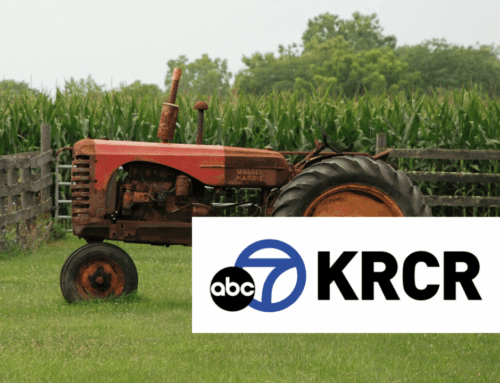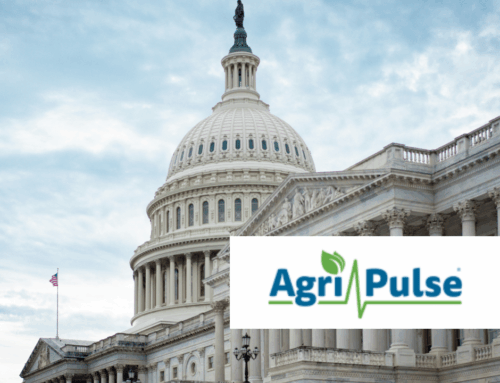Taxpayers for Common Sense submitted comments to the Federal Register concerning the Department of Agriculture's implementation of the recently passed trillion-dollar farm bill.
The USDA is confronted with many potentially costly decisions in implementing the numerous provisions of the 949 page Agricultural Act of 2014. From establishing rules that govern the newly created and potentially costly shallow loss income entitlement programs to defining who is “actively engaged” in farming and thus eligible to receive federal subsidies, the USDA will be busy determining the details for months and even years to come.
In our comments, TCS strongly encourages USDA to remember that while the agency may look at producers and other agricultural businesses as “clients,” it is taxpayers who foot the bill. Farm bills are notorious for vastly exceeding their estimated costs – the last two farm bills are on pace to exceed by $400 billion their Congressional Budget Office (CBO) scores at passage. The decisions USDA and its sub-agencies make in developing and administering the programs under their jurisdictions play an important role in determining whether taxpayer-funded agricultural programs will continue to be vastly over budget.
TCS strongly encourages USDA, and all government agencies, to implement the law while being cognizant of the reality that federal taxpayers are responsible for more than $17.5 trillion in debt and are facing annual deficits of $500 billion. Government agencies must not simply attempt to maximize spending, but follow the will of Congress in prioritizing federal support only where necessary and in a manner that is cost-effective and transparent.
See other submitted comments, including special interests requesting more parochial spending, in the Federal Register.
|
April 2, 2014
Michael T. Scuse RE: Implementation of Agricultural Act of 2014 Dear Under Secretary Scuse: Taxpayers for Common Sense (TCS) appreciates the opportunity to provide comments to the Farm Service Administration (FSA) and the Risk Management Agency (RMA) on the implementation of the Agricultural Act of 2014. Taxpayers for Common Sense is a non-partisan budget watchdog serving as an independent voice for American taxpayers. Our mission is to achieve a government that spends taxpayer dollars responsibly and operates within its means. The current agricultural subsidy system is a maze of market distorting and highly parochial policies that generally reward a handful of large farm businesses or well-connected industry segments at the expense of taxpayers. The system results in costly inefficiencies that detract from program goals and produce numerous unintended consequences. The federal government bears a disproportionate amount of the financial risks for agribusinesses to the detriment of taxpayers, consumers, and agriculture as a sector making it less competitive, less resilient, and less accountable for its impacts. TCS has long advocated for reforms to make the agricultural safety net more cost-effective, transparent, accountable to taxpayers, and responsive to current needs (see the attached document Reforming the Farm Safety Net: Principles for Accountability). While the Agricultural Act of 2014 fails to take the necessary steps to achieve this reformed safety net, instead expanding the role of Washington in agriculture through new business income entitlement programs and increasing spending on federally subsidized crop insurance, there is an opportunity to make progress in the implementation of some farm programs. TCS strongly encourages RMA and FSA to remember that while the agencies may look at producers and other agricultural businesses as “clients,” it is taxpayers who are footing the bill. Farm bills are notorious for vastly exceeding their estimated costs – the last two farm bills are on pace to exceed by $400 billion their Congressional Budget Office (CBO) scores at passage. The decisions RMA and FSA make in developing and administering the programs under their jurisdictions play an important role in determining whether taxpayer-funded agricultural programs will continue to be vastly over budget. TCS strongly encourages RMA and FSA to implement the Agricultural Act of 2014 while being cognizant of the reality that federal taxpayers are responsible for more than $17.5 trillion in debt and are facing annual deficits of $500 billion. RMA and FSA must not simply attempt to maximize spending, but follow the will of Congress in prioritizing federal support only where necessary and in a manner that is cost-effective and transparent. 1. New Agriculture Risk Coverage (ARC) and Price Loss Coverage (PLC) Programs (2014 Farm Bill sections 1111-1118) Eliminating the discredited direct payments and ACRE programs but then plowing the bulk of potential savings into new shallow loss income entitlements and Agriculture Committee-determined minimum prices is a Faustian bargain that never should have been forced on taxpayers. To minimize the costs and market distortions of these programs, TCS encourages specific payment limits for each program, not just an overall limit of $125,000 for PLC, ARC, marketing loan gains, or loan deficiency payments. Participants in each of these programs should be disclosed to taxpayers in an easily accessible manner. In addition, FSA must strictly enforce the accountability provisions – “conservation compliance” – to ensure producers who are receiving taxpayer subsidies protect the figurative and literal downstream interests of taxpayers who are funding these programs.
2. Common provisions for payment limits & payment eligibility for 2015 and subsequent crops (2014 Farm Bill sections 1603 and 1605) and actively engaged requirements for payment eligibility (2014 Farm Bill section 1604) Last year, a majority of both the House and Senate supported small steps to rein in unlimited subsidy payments to agribusinesses and landowners who have never stepped foot on a farm. However, these identical provisions, championed by Senators Grassley (R-IA) and Johnson (D-SD) and Representative Fortenberry (R-NE), were stripped from the final Agricultural Act of 2014 at the eleventh hour. Instead of stricter requirements about who can qualify as an “actively engaged” farmer, the decision about eligible subsidy recipients will be left to United Stated Department of Agriculture (USDA). We strongly urge FSA to close loopholes which have previously allowed deceased individuals, millionaires, city dwellers, children of wealthy producers seeking to maximize subsidies, and landowners who are not engaged in the day to day agribusiness to receive taxpayer subsidies. Years of inaction, fraud, waste, and abuse in these commodity subsidy programs must end. Numerous detailed suggestions on ways to close these loopholes and tighten eligibility requirements have been provided by USDA’s Office of Inspector General (OIG) and the Government Accountability Office (GAO). OIG recently found that crop insurance and farm subsidy programs are among 16 USDA’s programs most “susceptible to significant improper payments.” GAO has released numerous reports detailing how dead farmers and millionaires have been able to receive taxpayer subsidies. We urge USDA to act on OIG and GAO recommendations to ensure that the next five years of farm subsidy payments are more accountable and transparent to taxpayers. Making all taxpayer subsidies available to the public in an open and easily accessible manner would also be a welcome step in the right direction. 3. Highly erodible land and wetland conservation for crop insurance (2014 Farm Bill section 2611) The Agricultural Act of 2014 requires agricultural producers to meet a set of minimum conservation standards in exchange for generous crop insurance subsidies, in addition to commodity and conservation programs. The premise of these accountability standards – “conservation compliance” – is that receipt of federal funding is a two-way street and subsidies should not be used to tear up sensitive land, drain wetlands, and shift costs onto others. These farm bill provisions reduce the cost of agricultural pollution and limit long term liabilities by ensuring producers minimize soil erosion on highly erodible land and forgo draining wetlands. Unfortunately, the implementation and enforcement of these minimum conservation practices has varied from one area to another and has been poorly enforced and monitored in others. FSA, RMA, and Natural Resources Conservation Service (NRCS) should work together to ensure these accountability provisions are properly implemented, monitored, and enforced in the future. Adequate resources should also be provided to local officials for monitoring and enforcement efforts, and staff members should be well trained to ensure consistent enforcement from county to county and state to state. 4. New Supplemental Coverage Option (SCO) and Stacked Income Protection (STAX) programs (2014 Farm Bill sections 11003 and 11017) The federally subsidized crop insurance program is an overly generous, gold-plated program, with taxpayers covering on average 62% of the premiums for participants. The Agricultural Act of 2014 makes it even more complex and costly through creation of two new shallow loss income entitlement programs layered on top of premium-free catastrophic policies and highly subsidized buy-up coverage. To truly be tools of “risk management” as opposed to means of simply shifting financial risk from producers to taxpayers, the existing federally subsidized crop insurance program and new shallow loss income entitlements must be significantly reformed. RMA can take a number of steps in this direction. RMA should err on the side of caution and ensure premiums under SCO and STAX are adequately high enough to cover losses if commodity prices revert to their historic averages. Policies should be designed to incorporate best management practices that increase the resilience of the land to actual crop loss rather than simply compensate producers for their financial losses. Approved Insurance Providers should be required to keep a greater share of these policies to ensure the policies are adequately priced. And accountability standards – “conservation compliance” – must be strongly enforced to ensure taxpayer interests are protected. Thank you for the opportunity to comment on implementation of the Agricultural Act of 2014. Through proper implementation RMA and FSA have the opportunity to help create a more cost-effective, accountable, transparent, and responsive farm safety net. Sincerely,
Joshua Sewell |











